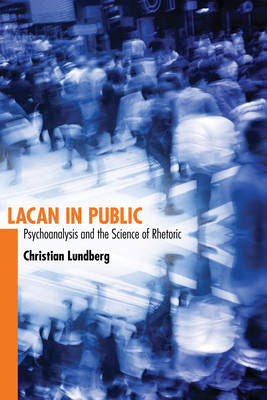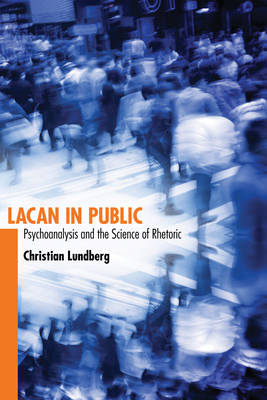
- Retrait gratuit dans votre magasin Club
- 7.000.000 titres dans notre catalogue
- Payer en toute sécurité
- Toujours un magasin près de chez vous
- Retrait gratuit dans votre magasin Club
- 7.000.0000 titres dans notre catalogue
- Payer en toute sécurité
- Toujours un magasin près de chez vous
Description
Lacan in Public argues that Lacan's contributions to the theory of rhetoric are substantial and revolutionary and that rhetoric is in fact the central concern of Lacan's entire body of work.
Though Lacan explicitly contends with some of the pivotal thinkers in the field of rhetoric (Aristotle, Cicero, and Quintilian) and familiar topoi (the oratorical tradition, the power of trope, stasis theory, and questions of contingency and context), rhetorical studies has been reticent to embrace the French thinker both because his writing is difficult and because Lacan's conception of rhetoric runs counter to the American traditions of rhetoric in composition and communication studies. Lacan's conception of rhetoric, Christian Lundberg argues in Lacan in Public, upsets and extends the received wisdom of American rhetorical studies--that rhetoric is a science, rather than an art; that rhetoric is predicated not on the reciprocal exchange of meanings, but rather on the impossibility of such an exchange; and that rhetoric never achieves a correspondence with the real-world circumstances it attempts to describe.
Lundberg proceeds from an analysis of Lacan's most recognizable maxim--"the unconscious is structured like a language"--and advances a rhetorical theory drawn from Lacanian psychoanalysis that provides a systematic account of rhetoric while simultaneously contributing to contemporary scholarship on Lacan.
As Lundberg shows, Lacan's work speaks directly to conversations at the center of current rhetorical scholarship, including debates regarding the nature of the public and public discourses, the materiality of rhetoric and agency, and the contours of a theory of persuasion.
Spécifications
Parties prenantes
- Auteur(s) :
- Editeur:
Contenu
- Nombre de pages :
- 248
- Langue:
- Anglais
- Collection :
Caractéristiques
- EAN:
- 9780817317782
- Date de parution :
- 26-11-12
- Format:
- Livre relié
- Format numérique:
- Genaaid
- Dimensions :
- 155 mm x 231 mm
- Poids :
- 589 g

Les avis
Nous publions uniquement les avis qui respectent les conditions requises. Consultez nos conditions pour les avis.






